- Home
- Deepak Chopra
Power, Freedom, and Grace Page 3
Power, Freedom, and Grace Read online
Page 3
As the Earth spins on its axis, we experience a twenty-four-hour cycle of night and day that we call the circadian rhythm. This rhythm is based on the spinning of the Earth, and everything in our body, being part of the Earth, is also spinning and following the rhythm of the Earth. When this biological rhythm is disrupted by long-distance travel, for example, we experience jet lag. Or if we work a night shift, we don’t feel quite right even if we rest during the day, because our biological rhythms are out of tune with the cosmic rhythms.
Scientific data shows that if we give an animal a certain dose of radiation at one time of the day, it may have a beneficial effect. If we give the same dose of radiation twelve hours later, the animal may die. Why? Because its physiology has changed completely in that twelve-hour period. Even a little bit of subjective experience tells us that at certain times of the day we feel hungry, while at other times of the day we feel sleepy. We know that we tend to feel one way at four o’clock in the afternoon, and another way at four o’clock in the morning.
Tidal rhythms also have an effect on our physiology. These rhythms are the result of the gravitational effect of the sun, the moon, and the stars in the distant galaxies on the oceans of planet Earth. We have an ocean within us that is similar to the oceans of our planet. More than 60 percent of our body is water, and more than 60 percent of our planet is water. So we experience a low tide and a high tide, and the tides ebb and flow in our own physiology. When we feel out of sorts, our body is out of synch with the body of the universe. Spending time near the ocean, or anywhere in nature, can help us to synchronize our rhythms with nature’s rhythms.
The lunar rhythm is a twenty-eight-day cycle that occurs as a result of the movement of the Earth, the sun, and the moon in relationship to one another. This rhythm is evident in the waxing and waning of the moon. We see the full moon, the half moon, no moon, and then the cycle starts all over again. Human fertility and menstruation are good examples of lunar rhythms, and there are many other twenty-eight-day cycles. When I worked as a physician in an emergency room, we would frequently expect to see patients with certain types of problems depending on the time of day and the cycles of the moon.
As the Earth moves around the sun, we experience seasonal rhythms as distinct biochemical changes in the body-mind. So we are more likely to fall in love in spring or get depressed in winter. People with a condition known as seasonal affective disorder get depressed in winter but feel better when you expose them to sunlight. Seasonal changes affect not only the biochemistry of the human body; they affect the biochemistry of trees, flowers, butterflies, bacteria, and everything throughout nature.
The Earth tilts on its axis in the spring, and flowers bloom, groundhogs come out of the ground, birds migrate, fish return to their spawning grounds, and mating rituals begin. People are moved to write poetry, lovers sing songs, and young and old hearts fall in love. Seasonal rhythms affect us biologically, mentally, emotionally, and it all has to do with the relationship of the Earth to the sun.
There are other cycles and rhythms that oscillate for just a few seconds, including electrocardiogram and brain waves, and there are rhythms that last anywhere from thirty minutes to twenty-eight hours called ultradian rhythms. There are cycles within cycles, and it gets very complicated, but it’s all one symphony. All of these rhythms create the symphony of the universe, and the body-mind is always trying to synchronize its rhythms with the rhythms of the universe.
To separate the body-mind from the rest of the cosmos is to misperceive things as they really are. The body-mind is part of a larger mind, it’s part of the cosmos, and cosmic rhythms result in profound changes in our physiology. The universe is truly a symphony of the stars. And when our body-mind is in synch with this symphony, everything is spontaneous and effortless, and the exuberance of the universe flows through us in joyful ecstasy.
The real expression of the body-mind is this field of intelligence that pervades every cell, that correlates all of these activities with one another, and that does all of this below the level of our conscious awareness. Scientists might call this expression of the body-mind infinite correlation. But if we are not scientists, we might call these qualities of the body-mind omniscient, omnipresent, and omnipotent.
While it may sound as if I’m speaking in mystical terms, in scientific terms this is an accurate statement. What could be a more dramatic example of omniscience, omnipresence, and omnipotence? The mind knows everything all at once, it is everywhere all at once, and it is all-powerful. As part of a vast field of intelligence, the mind extends far beyond the reaches of the cosmos. Though it might find expression in localized forms and phenomena, the mind is nonlocal, which means it can’t be confined to one location.
Time, too, is nonlocal. The fact that we can localize time is just a perceptual artifact based on the quality of our attention. This moment is at the center of eternity, but so is every other moment because eternity extends backward and forward from every other moment. There is no past or future, then or now, before or after; there is only the eternal moment. All that is experienced is experienced in present-moment awareness — in the here and now, and nowhere else.
We tend to think that there’s such a thing as time, but ask any physicist, “Is time a thing or a notion? Does time really exist, or is it just a concept to explain the experience of change in our environment?” An eminent quantum physicist, once said, “No experiment has ever been done that proves the existence of time.” Time is not a thing; time is an idea.
Physicists no longer use the word time; they use the term space-time continuum because they know that time is a relative phenomenon; it’s not absolute. The movement of planet Earth spinning on its axis and hurtling around the sun at thousands of miles per hour creates our experience of time. But time is an illusion; it’s an internal dialogue we use to explain our experience or perception of change and relationship.
Consciousness is infinite, unbounded, and eternal, which means it has no beginning, it has no end, and it has no edges or boundaries in time. How do you measure something that’s infinite? You can’t measure it. All measuring is conceptual, and infinity is beyond our conception. So we can say that time is the way consciousness measures the space or gap between one experience and another. In measuring itself, consciousness creates the experience of time and also the experience of space. The space-time continuum creates the experience of cause and effect, and this creates the experience of the material world.
How does all of this apply to us? Well, the way we interpret the concept of time — how we metabolize our experience of time — brings about distinct physiological changes in the body-mind. This is a fascinating aspect of our biology. Let me give you a few examples.
The circadian rhythm, which controls the cycles of sleep and rest, appetite and elimination, is easily disrupted by traveling across different time zones. Yet once while I was on a flight from Boston to London, I met an old friend. We were having such a good time that “time flew.” The flight took six or seven hours, but for us it seemed like we arrived, as the expression goes, “in a jiffy.” We forgot to sleep, we forgot to eat, we forgot to go to the bathroom. When we arrived in London, we didn’t even have jet lag. What happened in our case? Well, because of this faint notion that “time was flying,” our biology was unaffected by the change in time zones.
Many experiments have shown that our interpretation of time influences our biology. For example, what does the word Monday mean to you? An astonishing fact is that more people die in our culture on Monday mornings at nine o’clock than at any other time of the week. That’s a stunning accomplishment for which only the human species can take credit. Presumably no other animal knows the difference between Monday and Tuesday. And what is the difference? The difference is an idea, a notion, a thought — what Monday means to us or how we interpret it. There are people who say “I’m running out of time” because they have ten deadlines to meet. They are constantly trying to “beat time.” They look at the
same clock that you and I are looking at, but for them it’s moving faster as a result of their internal perception of time. If you measure their biological responses, you find that their heart rates are faster, their blood pressure is higher, their insulin levels are higher, and they have more heart arrhythmias per minute. And when they suddenly drop dead of a heart attack, time has indeed run out for them. They have converted their internal experience of time running out into the physical experience of time running out.
There are other people whose perception, internal dialogue, and interpretation of time is “I have all the time in the world.” And we find that their heart rate is slower, their blood pressure is lower, their biological responses are much smoother, and they live longer.
Then there are moments when time seems to come to a standstill, as in “The beauty of the mountain was breathtaking. Time stood still.” When time stands still, thought comes to a standstill. When thought comes to a standstill, the experience of change in the body comes to a standstill. In fact, what scientists call entropy, or aging, also stops in those moments because aging is, in part, an expression of how we metabolize or interpret time.
As a resident doctor, I worked in a psychiatric ward, and I noticed that some of the patients with psychoses had no concept of time. As a result, their bodies didn’t seem to age. I saw a sixty-year-old woman who looked as if she were thirty years old. There were many such individuals. Why? Because even the concept of time didn’t exist for them, and time is a concept to begin with.
So to bring this back to practical terms, all of these different experiences of time are nothing more than interpretations in our consciousness. How we interpret time, how we interpret space, how we interpret physical reality determines our experience of physical reality, including the experience of the physical body. Our body is the metabolic end product of our sensory experiences and our interpretation of these sensory experiences. How do you experience time or change? If you are always in a hurry and always trying to beat time or compete with time, you are causing those hurried types of changes in your biology. On the other hand, if your interpretation of time is truer to reality, which is, in fact, that there is only an eternal present, then your biology will reflect that truer notion.
In the present, you can experience the past; in the present, you can anticipate the future. But if you can stay in the present, if you can be with the present, then even the physical changes that normally occur with the passage of time will not occur in your body. There is a saying from a Vedic master: “The only reason people grow old and die is that they see other people growing old and dying.”
What we see, we become; what we touch, we become. Even our memories are constantly transforming themselves into physical reactions in our body. Our interpretation of reality, our interpretation of our body-mind, generates all kinds of biochemical reactions inside us. These interpretations become memories, and the memories spontaneously trigger transformations without our knowing it. And where are these memories located? These memories are everywhere. They are nonlocally present in our soul, they manifest in our brain cells, and they get encoded in every cell of our body.
Your body is a field of ideas, and the body you’re experiencing right now is an expression of all of the ideas you have about it. If you have the idea that your body is a physical machine, that it’s supposed to age in a certain way, that it gets imbalanced because of environmental changes, all of these ideas translate into chemical changes in the body. If these ideas change, and they will change according to scientific discovery, then just that change in how you view the body will spontaneously cause transformations in the body.
As a pattern of intelligence in a vast field of intelligence, you participate in creating the world you experience. The world “out there” may appear to be objective, but in fact the world is subjective; it is a construct of your own interpretations. You learn to interpret the world through your senses, and this brings about your perceptual experiences, including your experience of the body-mind.
An interesting example of how the body-mind interprets, participates in, and constructs its own experience is the placebo response. Years ago, doctors discovered that they could give people unmedicated sugar pills, tell them that the pills would kill their pain, and a certain number of patients, approximately 30 percent, would experience relief from their pain. This became known as the placebo response.
Then it was discovered that placebo responses occur not only in pain syndromes but in other conditions. So if doctors give patients a pill and say, “This is going to relieve your heart disease,” that simple notion in their awareness as a true idea causes them to make a chemical that has the effect of lowering their blood pressure and improving the flow of blood to their heart.
The placebo response is important to our understanding of the body-mind connection because the placebo response is basically an interpretation we make to ourselves. We don’t need to use affirmations; we just have a simple notion, “This is going to relieve my pain,” and the body-mind brings this about by making these very powerful chemicals.
Now, the opposite of the placebo response is the nocebo response. Let’s say a patient walks into a doctor’s office and the doctor says, “Mrs. Smith, I’m sorry to tell you, but you have breast cancer that has metastasized to all your bones. You have only six months to live.” If Mrs. Smith happens to believe everything her doctor tells her, she may translate this notion into that outcome. And what is the nocebo response? Just another interpretation we make to ourselves.
To realize the power of interpretation is to acquire a new definition of the body-mind. We can do wonderful things with this body. We can evoke the healing response from within because we have an inner pharmacy that can make the appropriate drugs. We can restructure our perception of time, which would completely restructure the physical expression of the body, so it would even be possible to retard or reverse the aging process.
The human body-mind is part of a conscious, thinking field of intelligence. In every second of our existence, the local expression that we call the body-mind is exchanging energy and information with the nonlocal expression that we call the universe. The only thing is, we are doing it unconsciously. The average person thinks about sixty thousand thoughts a day. This is not surprising. But it’s a little disconcerting that 95 percent of the thoughts we have today are the same ones we had yesterday. Every day we unconsciously create the same energy patterns that give rise to the same physical expression of the body.
Imagine that you could change the bricks of a building once a year, but through force of habit or because you didn’t know any better, you were stuck with the notion that there was only one way to create the building. So you’d put the bricks in the same places year after year, and you’d get the same kind of building. Well, if you have the notion that the body is supposed to weaken, age, or become ill with the passing of time, this notion is translated into those energy patterns.
Every interpretation we make in every moment has an effect on the energy patterns of our body. And we can change our interpretations because we made them in the first place. We have the power to make choices. But most people are victims of societal thinking; they are under the hypnosis of social conditioning. Our senses take in less than one billionth of the stimuli available to us, and our social conditioning reinforces what we think is possible, editing out what we don’t think is possible. We have to wake up and go beyond this hypnosis; we have to go beyond social conditioning to a deeper level. How can we do this? By witnessing the whole process and becoming conscious of it. Then we realize that there are choices.
Imagine that your nervous system is the hardware, and all the chemical changes that occur in your body are the software. The software, or program, changes according to your thoughts, feelings, interpretations, and desires. But there is a programmer. Who is the programmer? The programmer is the inner self, the silent witness, the ever-present awareness that witnesses everything. And when you get in touch with the s
ilent witness, this gives you the ability to rewrite the program.
As the silent witness, you recognize that you are the thinker of every thought. When you say, “I have an idea about such and such,” the “I” implies a thinker behind the thought. That thinker, the silent witness, is in the silent gap between your thoughts. It can’t be found in either the body or the mind because it’s beyond both body and mind. Between every thought is a little gap of silence, and that’s where you’ll find the real you. That gap is the corridor, the window, the transformational vortex through which you, the personal mind, communicate with the cosmic mind.
The silent witness is the programmer, the one who has the insights, the one who makes the choices. The silent witness is the one part of you that doesn’t change. If you find the part of you that doesn’t change, then you’ll be able to cause transformation in the part of you that does change. And you don’t have to do it by stating affirmations that your body is this, or your body is that. You don’t have to brainwash yourself about anything. You just need to have the understanding or the insight to spontaneously cause transformation in your body.
To become familiar with the miracle of the human body-mind is to acquire awesome power. This power is magical because it allows you to experience the body-mind as more fluid, more flexible, more dynamic, and more creative than you have ever imagined. But first you have to understand your true nature; you have to know the body-mind as it really is.
The field of pure consciousness creates, controls, and constantly becomes the body-mind. Get in touch with this field, and you have a completely new reality of the mind and a completely new experience of the body. You realize that you can change your body more effortlessly, more rapidly, more efficiently than you can change your clothes.

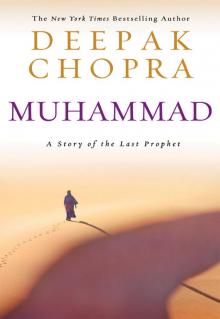 Muhammad: A Story of the Last Prophet
Muhammad: A Story of the Last Prophet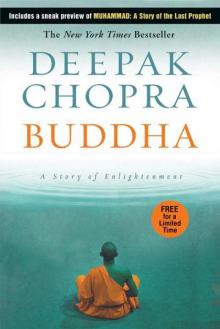 Buddha
Buddha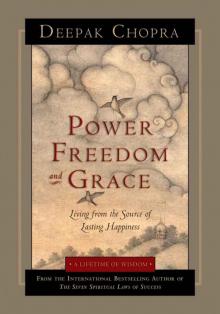 Power, Freedom, and Grace
Power, Freedom, and Grace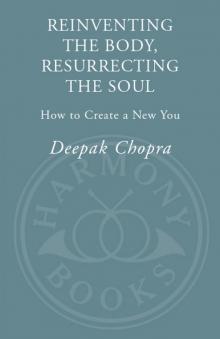 Reinventing the Body, Resurrecting the Soul: How to Create a New You
Reinventing the Body, Resurrecting the Soul: How to Create a New You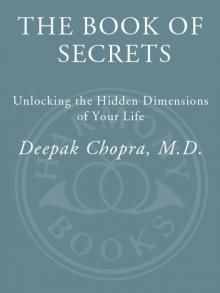 The Book of Secrets: Unlocking the Hidden Dimensions of Your Life
The Book of Secrets: Unlocking the Hidden Dimensions of Your Life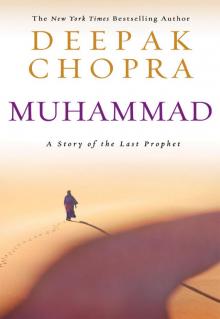 Muhammad
Muhammad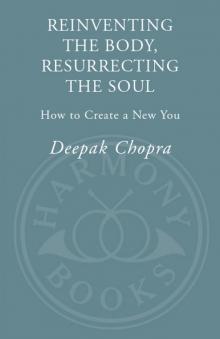 Reinventing the Body, Resurrecting the Soul
Reinventing the Body, Resurrecting the Soul